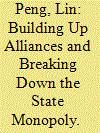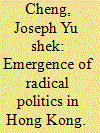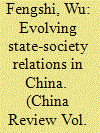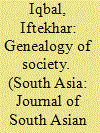| Srl | Item |
| 1 |
ID:
159843


|
|
|
|
|
| Summary/Abstract |
This paper explores the emergence of a highly networked and capable non-governmental organization (NGO) community in disaster relief in China. It provides a review of the growth of non-governmental actors in the relief field since the 2000s and examines the most important platforms and networks in the field, focusing on their strategies of maintaining a broad-based partnership, developing their own capacity, and enhancing overall inter-organizational connectivity. With an in-depth look at a successful joint non-governmental relief operation in Lushan in 2013, the paper also explicates how NGOs can break the state monopoly over disaster information management, public donations and relief operations. This research finds that during crisis times, non-governmental actors carry out relief missions effectively in parallel with state agencies. The rise of non-governmental disaster relief sheds light on one of many trajectories of civil society development in China where social autonomy is earned by innovation, public support and improved capacity.
|
|
|
|
|
|
|
|
|
|
|
|
|
|
|
|
| 2 |
ID:
129102


|
|
|
|
|
| Publication |
2014.
|
| Summary/Abstract |
This article reviews the literature on the radicalization of politics in Hong Kong. with an emphasis on its causes and impact. Evidence on the deteriorating living standards and the widening of the gap between the rich and the poor has been substantial. People naturally blame the government under such circumstances. They have been especially angry with government policies favoring the business community. and the "greed" and corruption of the Donald Tsang and C. Y. Leung administrations. The consensus on the origins. characteristics, modes of operation. and so on of the new social movements is strong: and the same applies to the failure of the government to anticipate and absorb their challenges. Confidence in the maintenance of social stability remains high. but there is little optimism that the performance of the govemment will soon improve.
|
|
|
|
|
|
|
|
|
|
|
|
|
|
|
|
| 3 |
ID:
153565


|
|
|
|
|
| Summary/Abstract |
This special volume attempts to enhance the understanding of a seemingly
paradoxical pair of patterns in contemporary Chinese politics,
namely, the resilience of the Communist regime and the robustness of
social autonomy. Th e papers, while contributing to the central theme
from different sectors/subfields, converge on the aspect where the
agencies of the Chinese state and the society interact and exert infl uence
on each other. Instead of simply giving away summaries and revealing
intricate findings, this introduction focuses on the overall scope and
shared analytical perspective of all the papers included, and the interlinkages
across them in order to facilitate the reading of the whole volume.
|
|
|
|
|
|
|
|
|
|
|
|
|
|
|
|
| 4 |
ID:
153020


|
|
|
|
|
| Summary/Abstract |
This paper explores the anxious and sometimes hostile relationship between modern forms of civil society and non-modern institutions in Bangladesh. I argue that an uneasy relationship arises from civil society's inability or lack of initiative to identify and negotiate with ‘pre-modern’ social institutions and their remnants, which I conceptualise here as samaj. Such dissonance and disengagement have been historically constructed largely with regard to the way in which the roles of the state, capital and market forces have been conceptualised at the interface between ‘modernity’ and ‘tradition’. This proposition demands a genealogical understanding of the relationship between civil society and samaj, in which the latter is represented by religious institutions such as the khanqah and the madrasa.
|
|
|
|
|
|
|
|
|
|
|
|
|
|
|
|